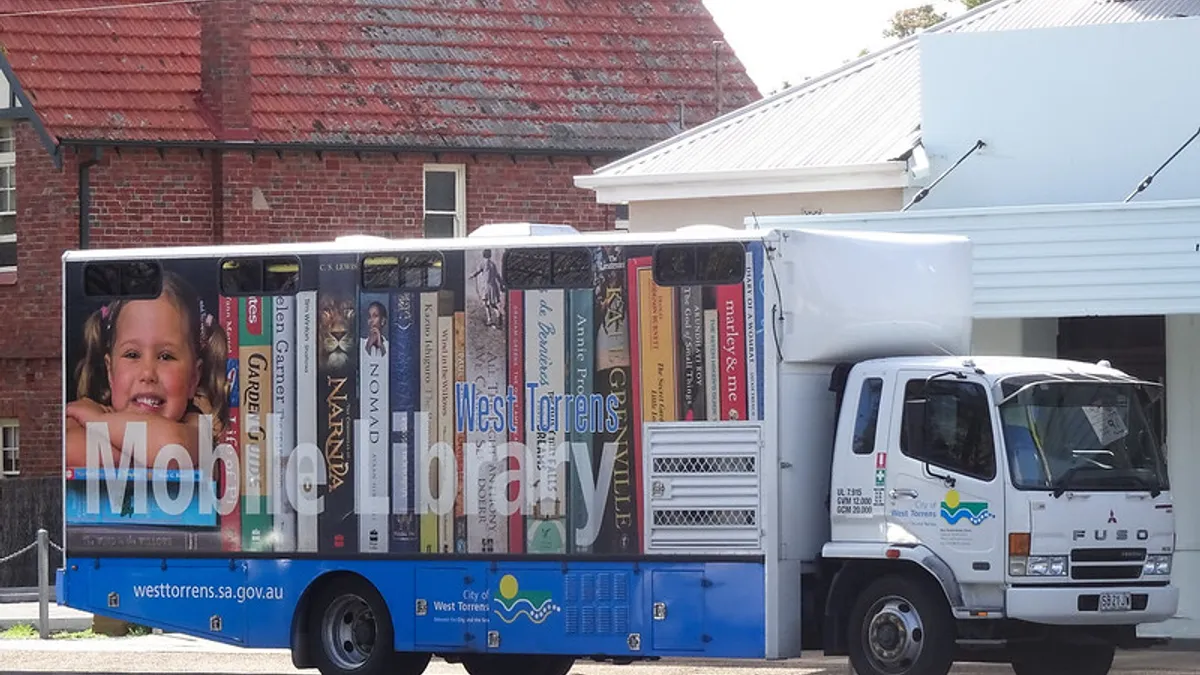Dive Brief:
- Libraries have been key partners to cities during the pandemic in tackling the digital divide, among other critical needs, and are now eligible to receive billions of dollars in coronavirus as part of the $1.9 trillion American Rescue Plan Act (ARPA) that passed this week.
- The Institute of Museum and Library Services (IMLS) received $200 million, "the largest single increase in the agency's 25-year history," according to the American Library Association (ALA).
- The ARPA also includes billions for academic, public and school library-eligible programs, including a $7.17 billion Emergency Education Connectivity Fund through the Federal Communications Commission's (FCC) E-rate program. Participating libraries will receive total reimbursement for the cost of hotspots, routers, laptops, tablets and similar devices loaned to their patrons.
Dive Insight:
Libraries have played a significant role in helping cities connect patrons to the internet throughout the pandemic for a number of needs, including the census count, remote school work, booking vaccine appointments and much more.
The ARPA represents a historic amount of funding, commitment and attention to the digital gaps that have plagued the country for decades, according to Larra Clark, deputy director of the Public Library Association as well as the ALA Public Policy & Advocacy Office. Libraries are an essential thread in our nation’s digital safety net, she said.
Libraries were forced to get creative over the past year in how they delivered internet access and devices, particularly as librarians prepared to face a demand greater than they experienced during the Great Recession.
Orange County, CA public libraries, for instance, adapted to the coronavirus and its constraints by using trailers parked at pre-designated locations to provide broadband for up to 150 users within a 300-yard radius, according to Clark. Staff would also be on-site to answer questions, provide books or help provide services in English, Spanish and Vietnamese.
Of the $200 million dedicated for IMLS, $178 million will be distributed for the Library Services and Technology Act that will go to library administrative agencies, including a $2 million state minimum. State libraries will distribute the funding to libraries for needs like creating mobile digital labs, improving job-seeker and workforce development programs, expanding access to technology through hotspots, computers, and more.
The ARPA also includes billions more in library-eligible funding, including the over $360 billion going to state, local and tribal community governments; $40 billion for colleges and higher education institutions; and $135 million to support state and regional arts and humanities agencies.
"In many cases, ARPA means libraries won't have to choose between funding community programs and paying salaries of the professional staff who lead them," American Library Association President Julius C. Jefferson, Jr. said in a statement.
"The pandemic has exposed the level to which Americans rely on libraries to access the internet and learn to navigate it, find jobs and gain new skills, learn to read and identify what information to trust, and become actively engaged in their communities," Jefferson continued.












